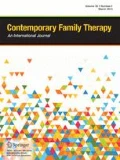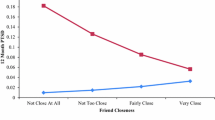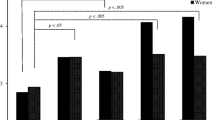Abstract
Previous research has demonstrated the association between family functioning and depression. This study evaluated family functioning and perceived social support in men and women in Shanghai who had received a diagnosis of a major depressive disorder (N = 100), including sixty-six women and thirty-four men. The relationship between family functioning and social support of outpatients with major depressive disorders was explored using the Chinese Family Assessment Device and the Multidimensional Scale of Perceived Social Support. The scores from all dimensions of family functioning for both men and women indicated that depressed men and women all reported experiencing unhealthy family functioning. The clinical implications of these findings for the developing practice of family therapy in China are discussed.
Similar content being viewed by others
References
Addis, M. (2008). Gender and depression in men. Journal of Clinical Psychology, 15, 153–168. doi:10.1111/j.1468-2850.2008.00125.x.
Allison, R. E. (1997). The concept of harmony in Chuang Tza. In S. H. Liu & R. E. Allison (Eds.), Harmony and strife: Contemporary perspectives, east and west (pp. 169–186). Hong Kong: The Chinese University Press.
American Psychiatric Association. (2000). Diagnostic and statistical manual of mental disorders, text revision (4th ed.). Washington, DC: American Psychiatric Association.
Barnett, P. A., & Gotlib, I. H. (1990). Cognitive vulnerability to depressive symptoms among men and women. Cognitive Therapy and Research, 14, 47–61.
Bildt, C., & Michelsen, H. (2002). Gender differences in the effects from working conditions on mental health: A 4-year follow-up. International Archives of Occupational and Environmental Health, 75, 252–258. doi:10.1007/s00420-001-0299-8.
Boughton, S., & Street, H. (2007). Integrated review of the social and psychological gender differences in depression. Australian Psychologist, 42, 187–197. doi:10.1080/00050060601139770.
Bouma, E. M., Ormel, J., Verhulst, F. C., & Oldehinkel, A. J. (2008). Stressful life events and depressive problems in early adolescent boys and girls: the influence of parental depression, temperament and family environment. Journal of Affective Disorders, 105, 185–193. doi:10.1016/j.jad.2007.05.007.
Burt, K. B., Van Dulmen, M. H. M., Carlivati, J., Egeland, B., Sroufe, L. A., Forman, D. R., et al. (2005). Mediating links between maternal depression and offspring psychopathology: The importance of independent data. Journal of Child Psychology and Psychiatry, 46, 490–499. doi:10.1111/j.1469-7610.2004.00367.x.
Cheng, S., & Chan, C. (2004). Assessing Chinese adolescents’ social support. The multidimensional scale of perceived social support. Personality and Individual Differences, 28, 299–307.
Cheung, G., & Chan, C. (2002). The Satir model and cultural sensitivity: A Hong Kong reflection. Contemporary Family Therapy, 24, 199–215.
Chou, K. (2000). Assessing Chinese adolescents’ social support: The Multidimensional Scale of Perceived Social Support. Personality and Individual Differences, 28, 299–307. doi:10.1016/S0191-8869(99)00098-7.
Cummings, E. M., Keller, P. S., & Davies, P. T. (2005). Towards a family process model of maternal and paternal depressive symptoms: Exploring multiple relations with child and family functions. Journal of Child Psychology and Psychiatry, 46, 479–489. doi:10.1111/j.1469-7610.2004.00368.x.
Cyranowski, J., Frank, E., Young, E., & Shear, M. (2000). Adolescent onset of the gender difference in lifetime rates of major depression: A theoretical model. Archives of General Psychiatry, 57(1), 21–27. doi:10.1001/archpsyc.57.1.21.
Deng, L., Lin, X., Lan, J., & Fang, X. (2013). Family therapy in China. Contemporary Family Therapy, 35(2), 420–436. doi:10.1007/s10591-013-9273-3.
Epstein, N., Baldwin, L., & Bishop, D. (1983). The McMaster family assessment device. Journal of Marital and Family Therapy, 9, 171–180. doi:10.1111/j.1752-0606.1983.tb01497.x.
Fan, C. C. (2003). Rural-urban migration and gender division of labor in transitional China. International Journal of Urban and Regional Research, 27(1), 24–27. doi:10.1111/1468-2427.00429.
Febres, J., Rossi, R., Gaudiano, B. A., & Miller, I. W. (2011). Differential relationship between depression severity and patients’ perceived family functioning in women versus in men. The Journal of Nervous and Mental Disease, 199(7), 449–454. doi:10.1097/NMD.0b013e318221412a.
Foster, C. E., Webster, M. C., Weissman, M. M., Pilowsky, D. J., Wickramaratne, P. J., Rush, A. J., et al. (2008). Course and severity of maternal depression: Associations with family functioning and child adjustment. Journal of Youth Adolescence, 37, 906–916. doi:10.1007/s10964-007-9216-0.
Gladstone, T., & Beardslee, W. (2009). The prevention of depression in children and adolescents: A review. Canadian Journal of Psychiatry, 54, 212–221.
Glick, I. (1982). A family therapist in the People’s Republic of China. Contemporary Family Therapy, 4(3), 177–183.
Hammen, C. (1999). The emergence of an interpersonal approach to depression. In T. Joiner & J. C. Coyne (Eds.), The interactional nature of depression (pp. 21–35). Washington, DC: American Psychological Association.
Hampson, R. & Beavers, W. (1989). Family therapy in the Peoples Republic of China: An update. Contemporary Family Therapy, 11(4).
Hankin, B. L., & Abramson, L. Y. (2001). Development of gender differences in depression: An elaborated cognitive vulnerability-transactional stress theory. Psychological Bulletin, 127, 773–796. doi:10.1037/0033-2909.127.6.773.
Herr, N., Hammen, C., & Brennan, P. (2007). Current and past depression as predictors of family functioning: A comparison of men and women in a community sample. Journal of Family Psychology, 21, 694–702. doi:10.1037/0893-3200.21.4.694.
Ho, D. Y. F. (1996). Filial piety and its psychological consequences. In M. H. Bond (Ed.), The handbook of Chinese psychology (pp. 155–165). New York: Oxford University Press.
Hovey, J. D., & Magana, C. E. (2000). Acculturative stress, anxiety, and depression among Mexican farmworkers in the midwest United States. Journal of Immigrant Health, 2(3), 119–131.
Hu, T., He, Y., Zhang, M., & Cheng, N. (2007). Economic costs of depression in China. Social Psychiatry and Psychiatric Epidemiology, 42(10), 110–116. doi:10.1007/s00127-006-0151-2.
Hughes, E., & Gullone, E. (2008). Internalizing symptoms and disorders in families of adolescents: A review of family systems literature. Clinical Psychology Review, 28, 92–117. doi:10.1176/appi.ajp.162.2.250.
Kendler, K. S., Myers, J., & Prescott, C. A. (2005). Sex differences in the relationship between social support and risk for major depression: A longitudinal study of opposite-sex twin pairs. American Journal of Psychiatry, 162, 250–256. doi:10.1016/j.cpr.2007.04.002.
Kilmartin, C. (2005). Depression in men: Communication, diagnosis, and therapy. Journal of Men’s Health and Gender, 2, 95–99.
Kleinman, A. (2004). Culture and depression. New England Journal of Medicine, 351(10), 951–953.
Kornstein, S., Schatzberg, A., Thase, M., Yonkers, K., McCullough, J., Keitner, G., et al. (2000). Gender differences in chronic major and double depression. Journal of Affective Disorders, 60(1), 1–11.
Kuhlman, I., Tolvanen, A., & Seikkula, J. (2013). Couple therapy for depression within a naturalistic setting in Finland: Factors related to change of the patient and the spouse. Contemporary Family Therapy. doi:10.1007/s10591-013-9246-6.
Lesch, K. P. (2004). Gene-environment interaction and the genetics of depression. Journal of Psychiatry Neuroscience, 29, 174–184.
Leung, K., Chen, C., Lue, B., & Hsu, S. (2007). Social support and family functioning on psychological symptoms in elderly Chinese. Archives of Gerontology and Geriatrics, 44(2), 203–213. doi:10.1016/j.archger.2006.05.001.
Liu, L., Zhao, X., & Miller, J. K. (2012). Use of metaphors in Chinese family therapy: A qualitative study. Journal of Family Therapy. doi:10.1111/j.1467-6427.2012.00582.x.
Ma, J. L., Wong, T. K., & Lau, Y. K. (2009). Sex differences in perceived family functioning and family resources in Hong Kong Families: Implications for social work practice. Asian Social Work and Policy Review, 3, 155–174. doi:10.1111/j.1753-1411.2009.00031.x.
Mahalik, J. R. (2008). A biopsychosocial perspective on men’s depression. Journal of Clinical Psychology, 15, 174–177. doi:10.1111/j.1468-2850.2008.00127.x.
Milan, S., Snow, S., & Belay, S. (2009). Depressive symptoms in mothers and children: Preschool attachment as a moderator of risk. Developmental Psychology, 45, 1019–1033. doi:10.1037/a0016164.
Miller, I. W., Epstein, N. B., Bishop, D. S., & Keitner, G. I. (1985). The McMaster family assessment device: Reliability and validity. Journal of Marital and Family Therapy, 11, 345–356. doi:10.1111/j.1752-0606.1985.tb00028.x.
Miller, J. K., & Fang, X. (2012). Marriage and family therapy in the Peoples Republic of China: Current issues and challenges. Journal of Family Psychotherapy, 23, 173–183. doi:10.1080/08975353.2012.705626.
Miller, I. W., Kabacoff, R. I., Epstein, N. B., Bishop, D. S., Keitner, G. I., Baldwin, L. M., et al. (1994). The development of a clinical rating scale for the McMaster model of family functioning. Family Process, 33, 53–69. doi:10.1111/j.1545-5300.1994.00053.x.
Morriss, R. K., & Morriss, E. E. (2000). Contextual evaluation of social adversity in the management of depressive disorder. Advances in Psychiatric Treatment, 6, 423–431. doi:10.1192/apt.6.6.423.
Nolen-Hoeksema, S., Larson, J., & Grayson, C. (1999). Explaining the gender difference in depressive symptoms. Journal of Personality and Social Psychology, 77, 1061–1072. doi:10.1037/0022-3514.77.5.1061.
Restifo, K., & Bögels, S. (2009). Family processes in the development of youth depression: Translating the evidence to treatment. Clinical Psychology Review, 29, 294–316. doi:10.1016/j.cpr.2009.02.005.
Ryan, C. E., Epstein, N. B., Keitner, G. I., Miller, I. W., & Bishop, D. S. (2005). Evaluating and treating families: The McMaster approach. New York: Routledge Taylor & Francis Group.
Ryder, A. G., Yang, J., Zhu, X. Z., Yao, S. Q., Yi, J. Y., Heine, S. J., et al. (2008). The cultural shaping of depression: somatic symptoms in China, psychological symptoms in North America? Journal of Abnormal Psychology, 2, 300–313. doi:10.1037/0021-843X.117.2.300.
Sakamoto, S. (2000). Self-focus and depression: The three phase model. Behavioural and Cognitive Psychotherapy, 28, 45–61.
Sander, J., & McCarty, C. (2005). Youth depression in the family context: Familial risk factors and models of treatment. Clinical Child and Family Psychology Review, 8, 203–219. doi:10.1007/s10567-005-6666-3.
Sarmiento, I., & Cardemil, E. V. (2009). Family functioning and depression in low-income Latino couples. Journal of Marital and Family Therapy, 35, 432–445. doi:10.1111/j.1752-0606.2009.00139.x.
Schraedley, P. K., Gotlib, I. H., & Hayward, C. (1999). Gender differences in correlates of depressive symptoms in adolescents. Journal of Adolescent Health, 25, 98–108. doi:10.1016/S1054-139X(99)00038-5.
Seidlitz, L., & Diener, E. (1998). Sex differences in the recall of affective experiences. Journal of Personality and Social Psychology, 74, 262–271. doi:10.1037/0022-3514.74.1.262.
Shanghai Municipal Government. (2009). The Encyclopedia for Shanghai. Shanghai & Technical Publishers. Retrieved from http://zhuanti.shanghai.gov.cn/encyclopedia/en/.
Shek, D. T. (2002). Assessment of family functioning in Chinese adolescents: The Chinese version of the family assessment device. Research on Social Work Practice, 12, 502–524. doi:10.1177/1049731502012004003.
Shek, D. T., & Chan, L. K. (1998). Perceptions of a happy family amongst Chinese adolescents and their parents. Journal of Youth Studies, 1, 178–189.
Shek, D. T., & Lai, M. F. (2000). Conceptions of an ideal family in Confucian thoughts: Implications for individual and family counseling. Asian Journal of Counseling, 7, 85–104.
Silberg, J. L., Maes, H., & Eaves, L. J. (2010). Genetic and environmental influences on the transmission of parental depression to children’s depression and conduct disturbance: An extended children of twins study. Journal of Child Psychology and Psychiatry, 51, 734–744. doi:10.1111/j.1469-7610.2010.02205.x.
Taylor, S. E., Way, B. M., Welch, W. T., Hilmert, C. J., Lehman, B. J., & Eisenberger, N. I. (2006). Early family environment, current adversity, the serotonin transporter promoter polymorphism, and depressive symptomatology. Biological Psychiatry, 60, 671–676. doi:10.1111/j.1469-7610.2010.02205.x.
Ting-Toomey, S. (1988). Intercultural conflicts: A face-negotiation theory. In Y. Kim & W. Gudykunst (Eds.), Theories in intercultural communication (pp. 213–235). Newbury Park, CA: Sage.
Uebelacker, L. A., Strong, D., Weinstock, L., & Miller, I. W. (2009). Use of item response theory to understand differential functioning of DSM-IV major depression symptoms by race, ethnicity, and gender. Psychological Medicine, 39, 591–601.
Wang, L., & Crane, R. (1994). Marriage and family therapy with people from China. Contemporary Family Therapy, 16(1), 25–37. doi:10.1007/BF02197600.
Wang, J. L., Fick, G., Adair, A., & Lai, D. (2007). Gender specific correlates of stigma toward depression in a Canadian general population sample. Journal of Affective Disorders, 103, 91–97. doi:10.1016/j.jad.2007.01.010.
Wang, J. K., & Zhao, X. D. (2012a). Family functioning, social support, and quality of life for Chinese empty nest older people with depression. International Journal of Geriatric Psychiatry, 27(1), 1204–1206. doi:10.1002/gps.2832.
Wang, J. K., & Zhao, X. D. (2012b). Family functioning and social support for older patients with depression in an urban area of Shanghai, China. Archives of Gerontology and Geriatrics, 55, 574–579.
Wang, J. K., Zhao, X. D., Liu, L., & Ma, X. Q. (2012). Family functioning, social support and depression in a Chinese population. Psychopathology, 45(5), 334–336. doi:10.1159/000336218.
Whisman, M. A. (2001). The association between depression and marital dissatisfaction. In S. R. H. Beach (Ed.), Marital and family processes in depression: A scientific foundation for clinical practice (pp. 3–24). Washington, DC: American Psychological Association.
Wilhelm, K., Parker, G., Geerlings, L., & Wedgwood, L. (2008). Women and depression: A 30 year learning curve. Australian New Zealand Journal of Psychiatry, 42, 3–12. doi:10.1080/00048670701732665.
Wilson, S., & Durbin, E. (2010). Effects of paternal depression on fathers’ parenting behaviors: A meta-analytic review. Clinical Psychology Review, 30, 167–180. doi:10.1016/j.cpr.2009.10.007.
Wittenborn, A. K., Culpepper, B., & Liu, T. (2012). Treating depression in men: The role of emotionally focused couple therapy. Contemporary Family Therapy, 34, 89–103. doi:10.1007/s10591-012-9176-8.
Yang, L. H., & Pearson, V. J. (2002). Understanding families in their own context: Schizophrenia and structural family therapy in Beijing. Contemporary Family Therapy, 24, 233–257. doi:10.1111/1467-6427.00214.
Yen, S., Robins, C. J., & Lin, N. (2000). A cross-cultural comparison of depressive symptom manifestation: China and United States. Journal of Counseling and Clinical Psychology, 68(6), 993–999. doi:10.1037/0022-006X.68.6.993.
Zimet, G. D., Powell, S. S., Farley, G. K., Werkman, S., & Berkoff, K. A. (1990). Psychometric characteristics of the multidimensional scale of perceived social support. Journal of Personality Assessment, 55, 610–617. doi:10.1080/00223891.1990.9674095.
Zlotnick, C., Kohn, R., Keitner, G., & Della Grotta, S. (2000). The relationship between quality of interpersonal relationships and major depressive disorder: Findings from the National Comorbidity Survey. Journal of Affective Disorders, 59, 205–215. doi:10.1016/S0165-0327(99)00153-6.
Author information
Authors and Affiliations
Corresponding author
Rights and permissions
About this article
Cite this article
Wang, J., Miller, J.K. & Zhao, X. Family Functioning and Social Support in Men and Women Diagnosed with Depression in China. Contemp Fam Ther 36, 232–241 (2014). https://doi.org/10.1007/s10591-013-9294-y
Published:
Issue Date:
DOI: https://doi.org/10.1007/s10591-013-9294-y




